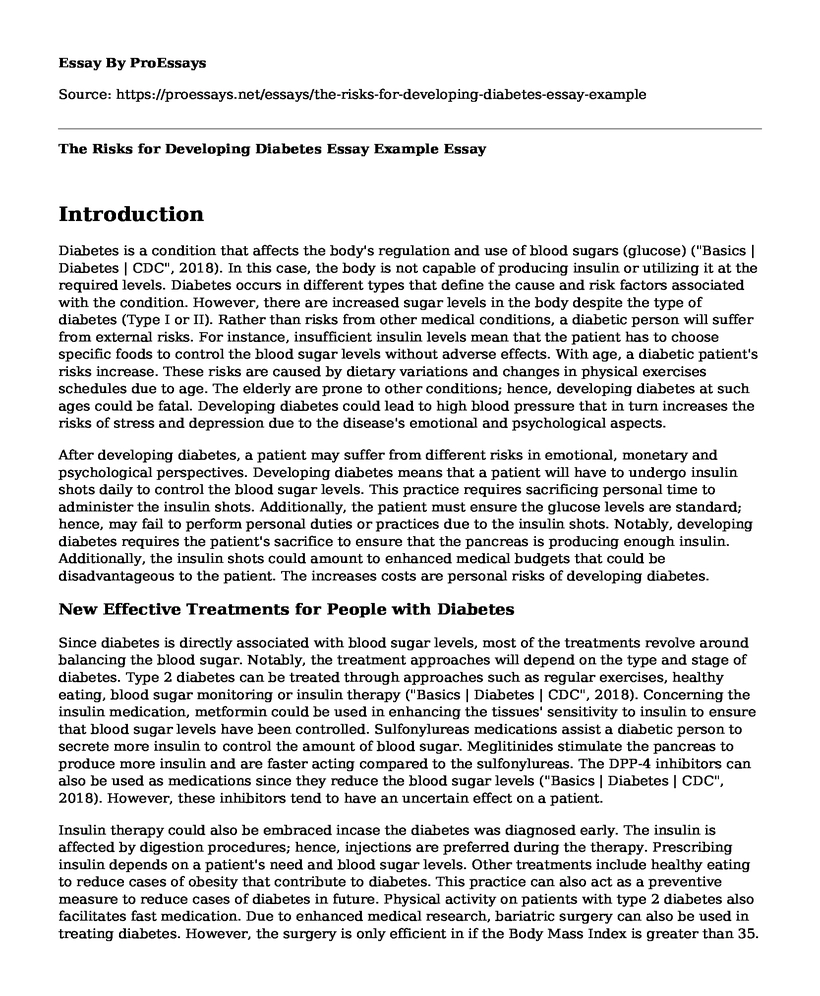Introduction
Diabetes is a condition that affects the body's regulation and use of blood sugars (glucose) ("Basics | Diabetes | CDC", 2018). In this case, the body is not capable of producing insulin or utilizing it at the required levels. Diabetes occurs in different types that define the cause and risk factors associated with the condition. However, there are increased sugar levels in the body despite the type of diabetes (Type I or II). Rather than risks from other medical conditions, a diabetic person will suffer from external risks. For instance, insufficient insulin levels mean that the patient has to choose specific foods to control the blood sugar levels without adverse effects. With age, a diabetic patient's risks increase. These risks are caused by dietary variations and changes in physical exercises schedules due to age. The elderly are prone to other conditions; hence, developing diabetes at such ages could be fatal. Developing diabetes could lead to high blood pressure that in turn increases the risks of stress and depression due to the disease's emotional and psychological aspects.
After developing diabetes, a patient may suffer from different risks in emotional, monetary and psychological perspectives. Developing diabetes means that a patient will have to undergo insulin shots daily to control the blood sugar levels. This practice requires sacrificing personal time to administer the insulin shots. Additionally, the patient must ensure the glucose levels are standard; hence, may fail to perform personal duties or practices due to the insulin shots. Notably, developing diabetes requires the patient's sacrifice to ensure that the pancreas is producing enough insulin. Additionally, the insulin shots could amount to enhanced medical budgets that could be disadvantageous to the patient. The increases costs are personal risks of developing diabetes.
New Effective Treatments for People with Diabetes
Since diabetes is directly associated with blood sugar levels, most of the treatments revolve around balancing the blood sugar. Notably, the treatment approaches will depend on the type and stage of diabetes. Type 2 diabetes can be treated through approaches such as regular exercises, healthy eating, blood sugar monitoring or insulin therapy ("Basics | Diabetes | CDC", 2018). Concerning the insulin medication, metformin could be used in enhancing the tissues' sensitivity to insulin to ensure that blood sugar levels have been controlled. Sulfonylureas medications assist a diabetic person to secrete more insulin to control the amount of blood sugar. Meglitinides stimulate the pancreas to produce more insulin and are faster acting compared to the sulfonylureas. The DPP-4 inhibitors can also be used as medications since they reduce the blood sugar levels ("Basics | Diabetes | CDC", 2018). However, these inhibitors tend to have an uncertain effect on a patient.
Insulin therapy could also be embraced incase the diabetes was diagnosed early. The insulin is affected by digestion procedures; hence, injections are preferred during the therapy. Prescribing insulin depends on a patient's need and blood sugar levels. Other treatments include healthy eating to reduce cases of obesity that contribute to diabetes. This practice can also act as a preventive measure to reduce cases of diabetes in future. Physical activity on patients with type 2 diabetes also facilitates fast medication. Due to enhanced medical research, bariatric surgery can also be used in treating diabetes. However, the surgery is only efficient in if the Body Mass Index is greater than 35.
The Risks of Developing other Diseases and Effects on the Body with Poor Management
Diabetic patients are at higher risks of contracting other diseases due to the linkage of causes and symptoms of the disease ("Basics | Diabetes | CDC", 2018). If not treated, diabetes could develop other conditions related to the blood sugar and pressure. The low blood sugar affects the large blood vessels in vital body organs such as the heart, legs, and brain. After contracting diabetes, there are various risks that are associated with the disease. Firstly, increased blood sugar levels could lead to vessel and nerve damages within the heart. An individual with diabetes has high possibility levels of suffering from heart disease due to complications on the vessels and heart nerves. Consequently, diabetes acts as an avenue for contracting heart disease depending on treatment and personal health. The heart disease caused by diabetes also depends on the high blood pressure that arises due to high blood sugar levels.
Kidney damage is also affiliated to some of the risks of contracting diabetes can be ranked as the main cause of kidney failure. The high cholesterol and blood pressure levels contribute to kidney disease since the kidney cannot perform its duties perfectly. The rise in blood pressure will affect the kidney's role of purifying blood due to excess strain on the millions of blood vessels used in the filtering system.
Diabetes can also enhance the risk of visual conditions such as blindness. Blood vessels in the retina can be affected by the increased blood pressure leading to poor vision and blindness in acute stages. Type II diabetes is associated with Alzheimer's disease. The condition leads to dementia depending on the stage of diabetes and blood sugar levels. A patient's body with poor management will increase the risk factors for diabetes due to treatments and prevention practices.
Reference
Basics | Diabetes | CDC. (2018). Retrieved from https://www.cdc.gov/diabetes/basics/diabetes.html
Cite this page
The Risks for Developing Diabetes Essay Example. (2022, May 26). Retrieved from https://proessays.net/essays/the-risks-for-developing-diabetes-essay-example
If you are the original author of this essay and no longer wish to have it published on the ProEssays website, please click below to request its removal:
- Mosquito-Borne Diseases
- Applying Ethical Principles in the Field of Health Care Case Study
- How Ethics Relates to Vaccinations? - Informative Essay
- Nursing Philosophical View: A Holistic Perspective on the 4 Meta Paradigms - Essay Sample
- Paper Sample on Eli Lilly: A Case Study on Changes in Pharmaceutical Industry
- Paper Sample on Tuberculosis: A Global Health Crisis
- Essay Example on Depression & Anxiety: Different Conditions, Common Symptoms







